#a young actor with a young impressionable audience…
Explore tagged Tumblr posts
Text
With the smoker-Will discourse in the tag, I thought I would share this article that talks about how ST and the huge role of smoking in the first few seasons and a study related to it, has literally lead Netflix to vow to cut down on smoking in their content.
This is also part of the reason why we saw little to no smoking in s4 and also why we’re likely to see little to none in s5.
They’re lucky they have the excuse that it’s the end of the world so chain smoking would be a pretty shitty habit to find yourself in.
Anyways, sorry to the smoker-Will enthusiasts, but it’s looking like a pipe dream…
#byler#see what I did there!!!??!?#pipe dream?!?#like smoking?#out of a pipe#forget it#also like yes it’s acting so if Noah was given a role where the character smoked he would be capable of it#but he’s also so young#and with this study and the implications surrounding it#it would be BAD press#bc all it does is make ppl watching want to go smoke a cigarette m#ngl I used to smoke but never got addicted so it was easy to get off of it#but if I saw Will Byers on my screen smoking a cigarette#I would run to the nearest 7/11 and get a pack…#cigarette sales 📈📈📈#and so therefore based on that alone…#a young actor with a young impressionable audience…#unlikely.#no hate to ppl having fun with headcanons just joking around#it’s really not that serious#idc he’s a fictional character#but I just remembered this news article and had to share it!!!
59 notes
·
View notes
Text
Post #1: Television
The television series Never Have I Ever on Netflix, centers a first-generation Indian teenager who’s struggling to find her way in high school, especially after her father passed away unexpectedly. While dealing with grief, cultural differences, and the usual social dramas of high school, she becomes braver and begins to find herself in some complicated situations due to impulsivity and a need for social acceptance from her peers. This series gives us a holistic perspective of a character’s personality and the challenges and victories that happen during adolescence. From a cultural perspective, this show does a great job of showcasing different parts of Indian culture and fights against common perceptions and stereotypes. Often times, the stereotype of first-generation Asian Americans (especially Indians) is being very academically successful and reserved, under the intense pressure of strict parenting. In this case, the main character, Devi, is very intelligent and does have a strict parent, but so many other sides of her personality are showcased throughout the course of the series. She has a very strong, outgoing, and dominant personality which goes against these pre-conceived perceptions. Not only does it focus on Indian culture, but through Devi’s life experiences, we get to see an unconventional family structure be represented, along with the challenges that come with it. This coming-of-age narrative shows us what it means to be a young woman, dealing with grief and the growing pains of accepting and loving her cultural identity as she becomes an adult. Aside from the narrative itself, it’s great to see Indian actors in the spotlight of a popular Netflix show where a young and impressionable audience is watching.
Last week, we looked at the Hapa project which can connect to these ideas directly. Watching people accept their cultural identities over time reminds me of this series and the journey Devi goes on throughout the course of it. At first, she rejects a lot of her culture, in order to try to fit in at school. While doing this, she realizes that overlooking her identity and pushing it away out of fear doesn’t serve her or her family. The more she learns to embrace it, the more confident and happier she becomes in her own skin.
Devi (left) with her aunt and mother

Sources Cited:
“hapa.me.” Kip Fulbeck, https://kipfulbeck.com/hapa-me/. Accessed 8 July 2024.
Never Have I Ever, created by Mindy Kaling, Netflix, 2020.
Joshi, Tara. “'Beyond Bend It Like Beckham': why Never Have I Ever is a win for Asian representation on screen.” The Guardian, 12 May 2020, https://www.theguardian.com/tv-and-radio/2020/may/12/this-is-no-bend-it-like-beckham-why-never-have-i-ever-is-a-win-for-asian-representation-on-screen. Accessed 9 July 2024.
0 notes
Text
▪️ Zombie Boy: How Rick Genest Transformed Visual Social Media ▪️
WEEK 8 - Body Modification on Visual Social Media
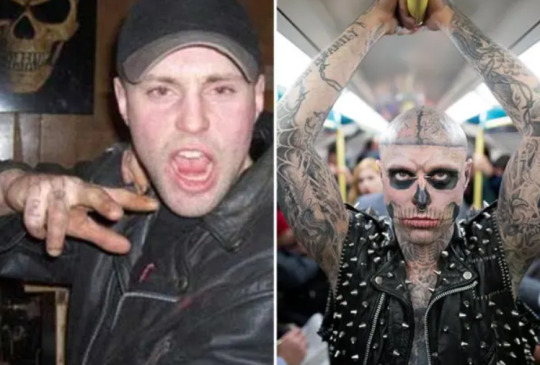
Hey hey hey, my fellow bloggie peeps ✨
Guess who's back with another blog post? That's right, it's me! 🩷
I know it's been a while, but I'm here and ready to share some new content with you all~
Welcome to today's blog, where we’ll be diving into something truly fascinating. We're gonna dive into the topic of Body Modification on Visual Social Media and I will be focusing on the one and only Rick Genest, aka Zombie Boy.Sadly, Rick passed away in 2018, but his legacy continues to inspire and captivate people around the world. Despite his untimely death, Rick's journey is filled with positivity, creativity, and the power of genuine support.
Let’s get into it right away now!

𝐑𝐈𝐂𝐊 𝐆𝐄𝐍𝐄𝐒𝐓: 𝐀 𝐋𝐈𝐕𝐈𝐍𝐆 𝐂𝐀𝐍𝐕𝐀𝐒
In our digitally connected world, digital citizenship goes beyond just our online actions—it’s also about how we present ourselves and influence others.
One captivating example of this is the late Rick Genest, aka Zombie Boy. Rick was a Canadian artist, actor, fashion model, and musician who left an unforgettable impact on visual social media with his unique body modifications. With a Guinness World Record for his full-body tattoos, Rick’s journey provides essential insights into digital citizenship and the health education surrounding body modification.

𝐈𝐍𝐅𝐋𝐔𝐄𝐍𝐂𝐄 𝐎𝐍 𝐕𝐈𝐒𝐔𝐀𝐋 𝐒𝐎𝐂𝐈𝐀𝐋 𝐌𝐄𝐃𝐈𝐀
Rick's presence on visual social media platforms like Instagram and Facebook was groundbreaking. His tattoos, which intricately depicted a decomposing body, were both shocking and mesmerizing. They challenged conventional beauty standards and sparked conversations about body modification, self-expression, and identity. Rick used these platforms not only to share his art but also to connect with a global audience, inspiring many to view tattoos and body modifications as legitimate forms of art and self-expression (Guichard-Kenny 2018).

𝐃𝐈𝐆𝐈𝐓𝐀𝐋 𝐂𝐈𝐓𝐈𝐙𝐄𝐍𝐒𝐇𝐈𝐏: 𝐑𝐄𝐒𝐏𝐎𝐍𝐒𝐈𝐁𝐈𝐋𝐈𝐓𝐘 𝐀𝐍𝐃 𝐈𝐍𝐅𝐋𝐔𝐄𝐍𝐂𝐄
Rick's journey highlights essential aspects of digital citizenship. By sharing his body modification journey online, he took on the responsibility of influencing how others perceive and engage with the concept of body modification. His candidness about his transformation and the artistic process behind his tattoos fostered a community that appreciated and respected diverse forms of self-expression (Dobson 2019).
However, with great influence comes great responsibility. As a digital citizen, Rick was aware of the impact his posts could have on young and impressionable audiences. He often spoke about the significance of his tattoos, not merely as a form of rebellion but as a deeply personal and artistic journey. His transparency and openness provided a more nuanced understanding of body modification, encouraging his followers to think critically about their choices and the motivations behind them (Motta 2018).
𝐇𝐄𝐀𝐋𝐓𝐇 𝐄𝐃𝐔𝐂𝐀𝐓𝐈𝐎𝐍: 𝐓𝐇𝐄 𝐑𝐄𝐀𝐋𝐈𝐓𝐘 𝐎𝐅 𝐁𝐎𝐃𝐘 𝐌𝐎𝐃𝐈𝐅𝐈𝐂𝐀𝐓𝐈𝐎𝐍
Rick's extensive tattoos also bring to light critical health education issues related to body modification. Tattoos, especially to the extent Rick had them, require significant consideration regarding physical health, mental well-being, and social implications.
When it comes to Physical Health, Rick's tattoos were done by professional artists under sterile conditions, minimizing the risk of infections and complications. His experience underscores the importance of seeking reputable tattoo artists and understanding the health risks involved (Mackinney-Valentin 2013).
As for mental health being, For Rick, tattoos were more than skin deep. They were a therapeutic and artistic outlet. However, not everyone has the same experience. Body modification can have profound psychological effects, and it’s crucial to approach it with a clear mind and realistic expectations. Rick’s journey encourages potential enthusiasts to consider their motivations and the potential long-term effects on their mental health (Matsyshyna 2016).
But to sum it all up, Rick’s appearance challenged societal norms and, at times, led to social stigmatization. His resilience and ability to turn his body into a celebrated work of art serve as a reminder of the societal challenges that come with extreme body modification. Educating oneself about these potential challenges is an essential aspect of the health education surrounding body modification.

𝐋𝐀𝐃𝐘 𝐆𝐀𝐆𝐀'𝐒 𝐑𝐎𝐋𝐄 𝐈𝐍 𝐑𝐈𝐂𝐊'𝐒 𝐈𝐍𝐒𝐈𝐏𝐈𝐑𝐀𝐓𝐈𝐎𝐍𝐀𝐋 𝐉𝐎𝐔𝐑𝐍𝐀𝐄𝐘
One of the most beautiful aspects of Rick's story is the incredible support he received from Lady Gaga. She recognized his unique artistry and saw something special in him. Their paths crossed when Rick starred in her music video for "Born This Way," a moment that skyrocketed his visibility and helped him gain recognition for his extraordinary self-expression (Galway & Mallon 2018).
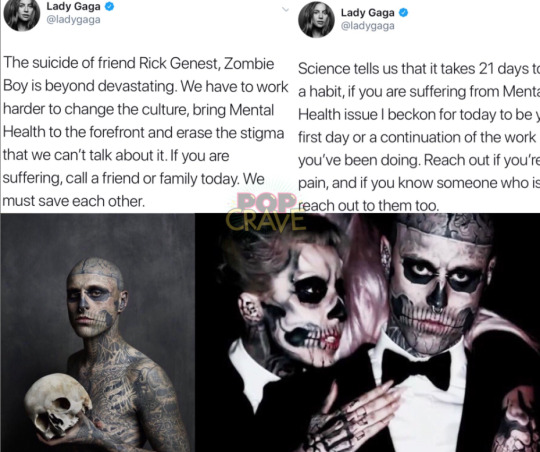
Lady Gaga wasn’t just a collaborator; she was a true friend and advocate. She often praised Rick’s talent and courage, using her platform to shine a light on his work and the art of body modification (Yebra 2018). Her support played a significant role in Rick’s rise to fame and helped break down barriers and stigmas associated with extreme body art.
Rick’s life may have been cut short, but his impact on the world of art, fashion, and digital media is everlasting. He showed us that self-expression knows no bounds and that true art comes from within. Lady Gaga’s unwavering support and belief in Rick's talent remind us of the importance of lifting each other up and celebrating our unique differences.
So, let’s remember Rick Genest not for his passing, but for the incredible legacy he left behind and the positive influence he had on the world, thanks in part to the support of a superstar who believed in his vision. Keep expressing yourself, and never forget the power of a supportive community! 💖
Love, Zen🌸
REFERENCES
Dobson, J 2019, ‘The marvellous history of medicine’, BMJ, p. l6603.
Guichard-Kenny, S 2018, ‘The Anatomical Tattoo’, Journal of Visual Communication in Medicine, vol. 41, no. 3, pp. 140–142.
Galway, K & Mallon, S 2018, Lady Gaga’s Twitter blunder and why speculating about suicide after a celebrity death is problematic, theconversation.com.
Motta, G 2018, Fashion through History: Costumes, Symbols, Communication (Volume I), Google Books, Cambridge Scholars Publishing.
Mackinney-Valentin, M 2013, ‘Face value: Subversive beauty ideals in contemporary fashion marketing’, Fashion, Style & Popular Culture, vol. 1, no. 1, pp. 13–27.
Matsyshyna, IV 2016, ‘Body-centrism in advertising texts, or how we are inured to pain’, AI & SOCIETY, vol. 32, no. 1, pp. 109–115.
Yebra, JM 2018, ‘Camp revamped in pop culture icon Lady Gaga: The case of “Telephone” and “Born this Way”’, European Journal of American Culture, vol. 37, no. 1, pp. 39–55.
#DigitalCitizenship#HealthEducation#BodyModification#VisualTattoo#VisualSocialMedia#RickGenest#LadyGaga#DigitalCommunities#MDA20009#mda2009
1 note
·
View note
Text
Television
Since the invention of the television, children have formed a paramount relationship with what shines through the silver screen. The media that has been created for children for decades long has been what created generations alike, and it has formed a sense of culture that can only be understood if the same media has been ingested. As Hollywood grew more and more popular, it was understood that television shows and productions were able to reach children better than movies could have. The short 30-minute episodes kept the children entertained, all while making them crave more from the story that was unwrapped in the previous showing. This never-ending cycle was proven still relevant as we entered the 21st century, with new and exciting television channels and shows that kept children forever entertained. After the rise of Nickelodeon in the 90s, a popular television program that was created for a children-only audience, producers saw no end in sight for the creation of new and exciting shows for the viewers of the world. My generation’s shows included iCarly, Victorious, Sam & Cat, Drake & Josh, Zoey 101, and countless others that bonded everyone who chose to tune in. The shows included light-hearted comedy and funny jokes that made us forget about the school day we just had, or the several pre-teen struggles that seemed to be never ending. The shows allowed us to disconnect for a while, and genuinely laugh out loud. Though as we grew up, it started to become obvious who the producers of our shows actually were, and what their playful jokes in the past truly meant. The writer’s room at Nickelodeon was used as a place to hide insensitive, inappropriate, and misogynistic jokes within the child stars’ lines that they delivered to a child audience. The “adult jokes for children’s media” phenomenon is extremely surfaced for the level of insensitive jokes that were made on the writer’s behalf, which we now know reflected some of their personal interests that got some incarcerated for after all. While the examples of this behavior are infinite, it is important to outline the most vile one in order to paint the picture for you, the viewer.
Zoey 101
In an early episode of the popular hit television show “Zoey 101”, an adolescent Jamie Lynn Spears and her friend starred in an episode that entailed her cast mate struggling to open a “goo pop”, which would later be seen being shot at Spears’ face. The “goo”, which was strategically placed by the prop crew in order to drip down her face in an obviously sexually-charged way, implied a certain sex act that went over millions of children’s heads when watching the scene. The scene has been described as “traumatizing” by one of the cast members, and no one could ever understand why that scene was just so important for the plot of the episode. Not one viewer questioned the show’s motive behind the episode, which would allow the writers and producers at Nickelodeon to continue their sexualized jokes that were “intended” for children only, and no one else. So many things can be written about this one scene, and it feels like there can never be enough said in order to prove just how disgusting this joke was. The blatant sexism and pedophilia that the writers felt as though they could get away with showing to young and impressionable children is astronomical, though a larger problem lies within the actor’s who were forced to continue with the scene and their lines. The producers at Nickelodeon exposed a young Jamie Lynn Spears to unsolicited sexual connotations that can be looked back on by the whole world, something that she will never get back. These patterns cause self-esteem issues that become embedded in girls’ minds, teaching them that the only way they can appeal to an audience is if they are heavily sexualized, not for their talent.
0 notes
Note
(I apologize for the mistakes) Hello, sweet Eden~! How are you doing? You love cats, right (as far as I understand)? Do you want me to share with you my most favorite photos of my cat? (⁄ ⁄•⁄ω⁄•⁄ ⁄)
Modsu, how are you doing? How is your health? Do you sleep, eat and drink enough water? Recently, there have been serious attacks on VN developers using yandere, so I want to remind you that we love and support you ❤
I'M HIJACKING THIS POST BECAUSE I WANT SO BADLY TO SEE CATS. AT ALL TIMES. PLEASE.
Also I'm okay! I've been spending a weekend out of state with my friends of many years, having a lot of fun! Because of that, I'm also unaware of what you mean? Attacks? Did something happen? If you mean run of the mill anon hate, I can handle that lol. I've been dealing with that for years and years.
I can't understand why harmless interest in a horror trope and indulgence through the safety of harmless fiction earns hate in some people's eyes. The only exception would be properties that write these tropes and mentalities as if they're healthy, or something you should desire in your real life. I'm certainly not the kind of person to go spouting that fiction doesn't affect reality, because the tone and intent of your project can make a world of difference in the message it puts across. But since all of the projects I know of and follow are tagged as horror, and the creators I've spoken to have been considerate, thoughtful and responsible, I would think that implies a level of self awareness that wouldn't suggest that anyone means to promote or justify toxic relationship dynamics like that. Nowhere is writing a dark story inherently equivalent to endorsing it. Even if there's porn in it. And anyone who enjoys it through the safe lens of fiction and fantasy, as long as they understand that fact, isn't hurting anyone. It's like reading a raunchy novel about having sex with a stranger, without all the dangers that come with doing that in the real world. That's part of the reason these accounts do not want minors interacting with their projects. A young and impressionable mind can wildly misinterpret these stories if distributed or consumed irresponsibly, and the results can be catastrophic. Nobody I know of in this community wants to endanger young audiences, and the bad actors that do are swiftly called out and cast out, plain and simple. As someone who's never been able to stomach keeping quiet about people pulling sick shit, I like it that way.
I wrote a thesis back in school about the dangers of romanticizing abusive and toxic relationships, so I feel like I know what I'm talking about; but even still I am always open to considering new opinions and concerns, of course. I'm also free to disagree with you. And in the first place, if you are uncomfortable with the subject matter, I urge you to not expose yourself to it in the first place! I don't mean that in a "Haha, I'm ✨problematic✨, dont like it? leave." type of way, either. Shutting out criticism entirely is never wise. What I mean is simply that you should never worsen your mood or mental state for something that's just not your cup of tea! Horror isn't for everyone! Erotica isn't for everyone! And that's perfectly fine! I don't want you here if you're not going to enjoy yourself! My main goal in all of this is to make something fun and creepy for others who like fun and creepy things to sink their teeth into, but I can't and won't do that unless I can do so responsibly and respectfully. I'm never justifying these behaviors, and I'm certainly NEVER trying to encourage anyone to seek relationships like these out. If anything, I'd hope the narrative I intend to weave with Parasocialite would portray the fear and the horrors of it realistically. I definitely don't want rose tinted glasses to be on for the experience.
Anyway, here's a silly picrew of Eden
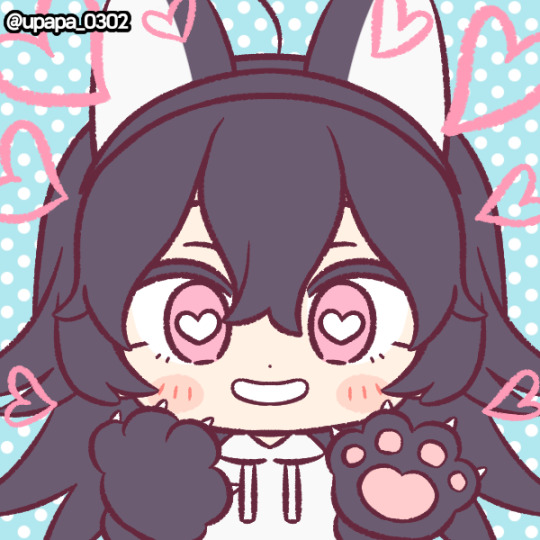
19 notes
·
View notes
Text
.
#i feel like most problems would be solved if the entertainment industry casted romantic partners within a reasonable age of each other#like why is it that every fucking movie the actors (or even ages of the characters) are +/- 15 years#like lets keep it at +/- 2-3 years#im just upset over this movie in particular because the main audience is going to be young impressionable girls (and kids in general)#its just saying: a teenager can be with a full grown man! its fine!!#idk it rubs me the wrong way#thats my thoughts#shut ai
3 notes
·
View notes
Text
i reblog “anti” ao3 stuff at least like once a week so there’s no way anon is just noticing how critical I am of them 😭 I’m not even against having a website to host original and fan made stories but ao3s refusal to properly tackle the constant racism, pedophilia, and other actively harmful content on their website while making soooo much extra money from donations that could be going to like idk… people and organizations that actually need it… like idk man I think there are more important things than wanting to read about two straight men playing out gay stereotypes written by some cishet white woman who has enough money to go to Disneyland once a month 🤨
And any one who’s like boohoo free speech boohoo queer expression 1) hate speech does not count and it never has and you know it 2) there is a clear difference between exploring difficult subjects which I am ALL for like ofc, but the shit on ao3 is more often than not just straight up child porn, some of it including porn written about real child actors mind you… 3) there are a million and trillion other ways to express queerness that doesn’t also give pedophiles the tools to groom and harm kids, or allow impressionable young kids and teens access to potentially harmful and traumatizing content. And I say all this both as someone who had access to stuff like that as a kid, got groomed and tricked into doing shit I didn’t want to, a victim of csa, and someone who experienced harassment and racism through fandom spaces at a very young age.
All most people are asking for is some moderation… the bare minimum in any space that is accessible to younger audiences.
But also so so so serious if you donate to ao3 but then don’t even reblog or share someone’s donation post or at the very least donate a dollar to some form of charity or something then there is something deeply deeply wrong with your worldview and your relationship to the marginalized communities around you…
37 notes
·
View notes
Note
That’s fair, I think you pull it off (the eyepatch) very well, Yahiro!
When you were young did you have interest in law? Was it something you always kinda wanted to get into?

He puffs his chest out and raises his chin like a proud showdog.
"I think so too."
Clearly, it doesn't hurt to hear once in a while though.

"And well... Sorta? I think every teal goes through their lawyer phase when they're young. They really hammer in the whole caste-specific jobs thing when you're all tiny, squishy, and extremely impressionable. I think most teals at least CONSIDER being a lawyer at some point in their lives. Me included. It just so happened that mine stuck. Not without some internal debate though.
Y'see, I always had an interest in the performing arts. Something about being able to control an entire room's thoughts and feelings just blew me away. It always seemed really cool that an actor can move an audience to tears even though they're just reading off of a script some random guy wrote. So yeah, I considered being a lawyer, but I ALSO considered getting into acting or something similar. It was when I realized I didn't actually need to choose that everything clicked into place.
The courtroom is just a stage! The jury is my audience! And like Billie Fliynn says, you gotta razzle dazzle 'em!"
Maybe not a great role model, considering the contents of the musical he's referencing, but the point is there.
6 notes
·
View notes
Text
Perhaps everyone already know it but me(or even I might had seen it before;;), but I’ve found a rsl interview on the dead poets society (https://rsl-daily.livejournal.com/140836.html), he talked about the behind the scenes in great detail and I thought it’d be an interesting read to those who are just fan of the film.
To those who haven’t read this before… enjoy!
____________________________________________________________
unknown: from script to screen
The Collaborative Art of Filmmaking
by Linda Seger and Edward Jay Whetmore
From Script to Screen
unknown
Robert Sean Leonard on Dead Poets' Society
All seven of us boys arrived a week before shooting. We were told that the week was reserved for haircuts and learning how to play soccer. It turned out to, be a week of getting to know each other. The first morning we went through the script as it was, and the following mornings were basically improvisations.
Once Peter Weir directed us to get up one by one and give a speech in character. He would do silly things, like he would pretend he was a teacher putting together a Christmas pageant and we were all supposed to be in it. Some of us formed a human sleigh and the rest of us had to be reindeer. Maybe it was silly but it got us in touch with our characters and the feeling of the script. And it also helped us get to know each other.
The Cave Scene
Right away Peter told us that the poetry scene, the first scene of the boys in the cave, would be the hardest scene to pull off in this movie. The audience has to believe that there are seven young guys in this cave that are having a good time reading poetry. They don't want to leave. And Peter said if we could make that scene work, the movie would work.
In the original script, that first cave scene had problems. It was just us reading poetry. One of us had a line like "Isn't this fun?" or "How great." Finally Peter said to us, "I just don't believe it. I don't believe that these guys would sit in a cave at midnight and just read poetry."
And then he said something I'll always remember because it was wonderful. He said, "I don't know what happened that night in the cave, but you all do. That's why I hired you. I met you and I knew from talking to you that you were all there. You know what went on that night and I need you to tell me." So we all went home like fiends and wrote seven different scenes on our own, and we worked together, and improvised a lot of ideas.
Late at night somebody would knock on my door and say, "I have an idea about this," and then we'd discuss it. Then he'd disappear and we'd keep writing. It was incredibly collaborative and fun. We came up with things like the food and the ghost stories and the Playboy magazine. We thought of how we would sulk around at school and rag on our teachers.These were things that we honestly thought would occur. We'd bring them to Peter and he'd say, "You're right, do it."
Up on the Roof
There was always a kind of freedom. He would take in all of our ideas, keep some, throw some out, and then have Tom rewrite scenes. Like in the final version there's the scene where Ethan [Hawke] and I throw the desk set off the roof. Ethan and I had done the original version of that scene together for Peter when we had auditioned. Ethan says, "It's my birthday." I ask him what he got-was it the same thing his parents got him last year? And he says yes.
In the original version he goes on about his family and says, "I used to think that all parents just automatically loved their children and now I know it's not true. Because my parents certainly don't love me, or at least not as much as they love my brother." And then he walks away and I sort of look after him with concern.
We shot the scene at three in the morning and Peter said, "I don't think this is right. I think we already know all this. We're overstating it. The audience knows this by now. It's in the performance, it doesn't need to be said. I'd rather this scene be more about friendship than about a confession or exposition on the boys' problems. I want it to be more active, I want something to happen."
So he put it in our hands, and we went off and decided to destroy the desk set. Peter said it was a good idea but he wanted us to throw it off the roof because we only had three desk sets to work with. So the three of us wrote the scene on the spot. Half of it was improvised in front of the camera. It was great.
Another scene that got changed was where I perform in the play. Originally my character's father walks onstage in the middle of the performance and drags me off in front of all the other actors and the audience. Peter wanted me to complete the performance, to see the people cheering. And that's what we did.
The Big Sleep
My character's suicide was obviously a major scene in the film, and it kind of hung over everything. At the beginning of filming Peter explained, "I want you to put that scene out of your mind, I don't want you playing it like this boy is doomed. I want you to pretend that he goes on to become a doctor or lawyer, there's nothing wrong." He didn't want to give the audience any clues. He wanted it to be one of those cases where everyone says, "My God, he would be the last person I would ever have thought would have done that!"
We shot it toward the end of production. Much of my preparation was subconscious. A lot of it involved the love I felt for all the boys, and for Peter and Robin. I just adored Kurt Smith who played my father. When you're surrounded by people that you're comfortable with and that support you, the difficult scenes become a lot easier.
I did read a lot about teen suicides and quotes from people who had attempted it. I found that a lot of teenage suicides happen because their world is smaller and it's much easier to feel trapped, especially somewhere like that school. They don't know the world beyond the school. Their parents and teachers are their whole universe.
Neil was like a child who had his candy taken away. His father takes acting away and tells him he's going to go tomilitary school, there's no choice in the matter. It's the end of everything he knows and loves.
When you're that young, you don't feel that there are any options. That's where the trapped feeling comes from. No future. And I don't think Neil thinks it out too much. For him it's a romantic, passionate decision.
Working with Robin Williams
There's a scene with Robin in the schoolroom where I lie to him and tell him that my father gave me permission to be in the play. He says, "Did you tell your father? What did he say?" and I say, "It will be fine." The scene was only about five lines and then I was to get up and leave.
But when the camera was on me, instead of letting me leave, Robin repeats the questions again, "Really, you really told him?" In my mind I'm thinking, why aren't we cutting? What's happening here? We're completely off the script and why aren't we cutting? Robin says it again, "Really, you told him what you told me?" And he looks in my eyes, and I'm terrified. I say, "Well, he wasn't happy," and then I mumble something, which I don't think makes any sense, like "He'll be in Chicago, so it won't really matter." I totally made that up as the camera was rolling. Robin just tortured me. He kept repeating all the questions, and I had to improvise different answers. I'm totally on the spot. And of course it comes across wonderfully that I'm lying.
Peter said, "Cut" and "Perfect," and that was the take that was used.
Robin made that scene work, and that was his strength. He's incredible on his feet. We were all very young and impressionable, and I would never have had the nerve to go completely off book with Robin Williams. But it was his place to do that, since he was the star. And he did. He treated us as equals. He was a joy to work with.
130 notes
·
View notes
Text
It's amazing what people telling you when you were young and impressionable does to you even when you're an adult that knows better.
Like the OC thing. I was always so gunshy about putting OCs in my work unless I absolutely NEEDED to and even then they were there to fill out the world and never took on a starring role or a role of any significance. All because of the ALL OCS ARE MARY SUES argument which scared me out of talking about ANY of my private OCs. Ever.
And then I played a well-liked original character for years across various RP games and got over it for the most part.
But I still haven't gotten over my "author fancasts are cringe" thing, which... actual authors do this! And I love it when they do! But I got told in a review of one of my fics that DID have OCs that "you shouldn't say who you'd cast for each character because it ruins the experience for the audience who want to have their own interpretations" and now I'm like well damn.
Incidentally, I cannot draw so every OC I have is based on some sort of actor unless they're just completely not human... and even then. I mean... [waves hands at Chance] And I just don't talk about it often BECAUSE THAT RANDOM PERSON TOLD ME IT WAS CRINGE TWENTY YEARS AGO.
3 notes
·
View notes
Text
Multitudes of Art from Wenhui Daily
Original article: Print Media by Wenhui Daily (1) http://whb.cn/zhuzhan/xinwen/20210815/415430.html and (2) http://whb.cn/zhuzhan/xinwen/20210815/415432.html
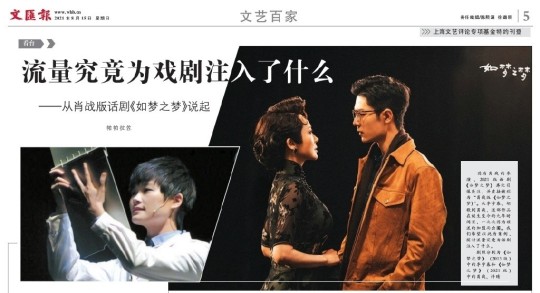
Xiao Zhan Performs in “A Dream Like A Dream”, What Traffic has Injected into Theater
Original author: 帕帕拉佐
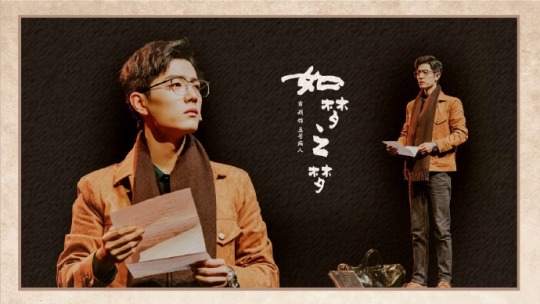
Preface
Whether the traffic celebrity is capable is a problem, it is also another problem when there is no traffic celebrity in the theater scene. This time, because of Xiao Zhan, another group of people who are unrelated to theater started going into it. Perhaps after the indescribable wonderful 8 hour experience, some of them would truly fall in love with theater, some may continue to fork out money for her idol’s next scheduled event. But is it really that important to separate the “I’m in the same room with him for 8 hours” crowd from the theater audiences?
1
Theater, which used to be a niche form of art, had been breaking through its circle these two years, and causing a lot of discussions. The most recent would be “Top Traffic Celebrity” Xiao Zhan’s participation in “A Dream Like A Dream”.
In between the midst of filming a period fantasy drama “The Longest Promise”, Xiao Zhan performed as Patient No. 5, a role which Hu Ge had once performed. After the performances in the 3 stops Wuhan, Qingdao and Chengdu, at every play’s curtain call, the theater would be filled with endless applause, there was even once even covered with rousing ovation. In the cheers of nearly a thousand people, the voices of young ladies were particularly distinct.
Actually, this is not the first time Xiao Zhan’s participation in “A Dream Like A Dream” created a revelry in his fans. Early this year in March, once the official announcement that Xiao Zhan would participate in the Tour of 9 Cities, it went onto hot search immediately, and until now, Xiao Zhan’s participation in “A Dream Like A Dream” has accumulated a staggering 4.2 billion views.
Over thousand tickets were sold out in seconds, an 80 RMB ticket was scalped to over a 1,000 RMB, the tickets of the “lotus pond seats” were scalped to more than 20,000 RMB. Although Chris Li and Hu Ge both performed in this play in 2013, but since it birth 9 years ago, this magnitude of furor only happened this year.
In the midst of anticipation and suspicion, Xiao Zhan finally walked on stage. The trials of theater revealed the sincerity in him and this sincerity is Xiao Zhan’s base color, or it could even be said to be the reason he is surrounded by so much love.
This innate sincerity is a scarcity in a stage created by glorious vocals and technical construction. Many experienced actors with strong foundations would be working hard for this, but they never had it.
No one could deny that Xiao Zhan created a unique Patient No. 5, who threaded the whole play as a core character. For the actor to be a good Patient No. 5, he would need precise acting, thorough understanding of the role, firm control of emotions, and of course the blending of both the actor’s self and the character.
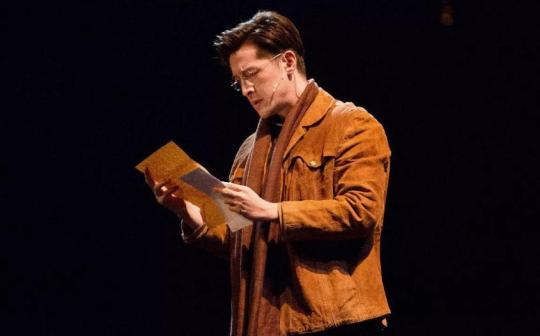
That year, the tranquility that Hu Ge had after coming back from his tribulations became his key to unlocking Patient No. 5; whereas for Xiao Zhan, who had went through the growth from an “idol” to a “top traffic celebrity”, who had a “unique” experience in cyberspace, the things that happened to him these few years, became his natural advantage in portraying Patient No. 5.
Last year, Yanghua held “Cao Yu’s Special 110 Year Old Commemoration Event”. Then, Xiao Zhan was still in the eye of the storm, and he had a conversation with Cao Yu’s daughter, Wan Fang, and in this conversation, Xiao Zhan did a tremendous amount of homework, and wrote down a few dozen questions regarding Wan Fang’s script “Winter Journey” and “You and I”, his questions were simple but impressionable, it gave people the feeling that he seemed to have reached the edge of theater.
In this conversation, he dazzled Wang Keran, the producer of “A Dream Like A Dream”. He seemed to have found the common point between Xiao Zhan and Patient No. 5: the impermanence nature of fate.
And once again, it proves that instincts were very useful. The intersection between the actor and the role’s life would become the crux to whether the actor is able to infuse a soul to his character. The reason he was able to establish his character was not entirely from his ability to craft roles, but more of the source came from what happened to him. In addition, Xiao Zhan’s intelligence and hard work left a deep impression on Wang Keran during the initial stages of rehearsal – while many actors had not memorized his lines, Xiao Zhan had already memorized all of his lines, and this is especially difficult given that “A Dream Like A Dream” was an 8 hour long performance and there are about 3 to 4 times more lines than a standard play.
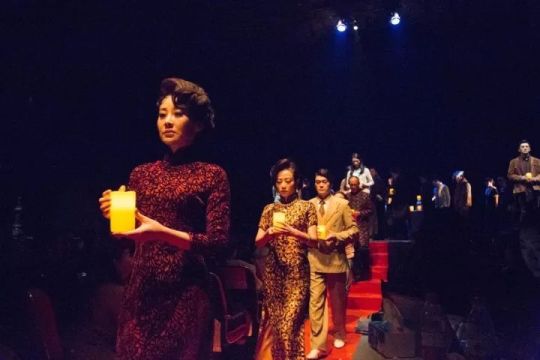
Whether the traffic celebrity is capable is a problem, it is also another problem when there is no traffic celebrity in the theater scene. As the theater market becomes more mature operationally, more traffic celebrities would cross over to this foreign scene. At the same time, there would be controversy as well. Can the boundaries between theater and general public be broken through by “traffic celebrities”? When will theater become a “reality TV theater”? Would the audiences be looking at celebrities instead of the play? These kinds of debates had always existed. At this, Lai Shengchuan did not care too much about it. He spoke of an incident in the past, when “A Dream Like A Dream” invited Chris Li to perform, her fans did not simply watch a show, but they watched 10. During the intermission, Lai Shengchuan spoke with her fans, and he realized that hey had been watching for 5 days straight, saying “the play was awesome”.
To him, despite the difference between how traffic celebrities shine on stage and how theater is like, or perhaps foreign to then, he just has to look at how they work to know that it took a lot of talent and hard work to come this far! “Hence, don’t be too particular about whether traffic celebrities are suitable for theater.”
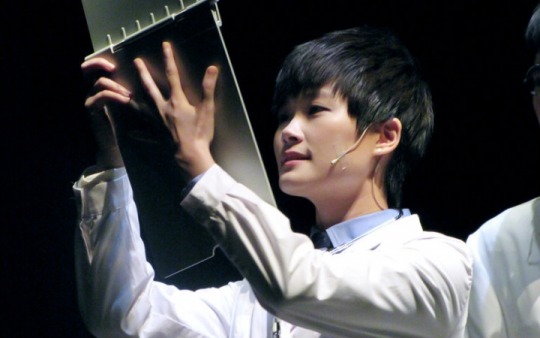
No matter how loud the controversy is, it is fact that theater trains people – a performance of a few hours, there is no pause, no post production, there is only one take with no chance of a retake. Hence, there has always been a hierarchy in the artistic circle, theater actors would be above movie actors, movie actors would be above TV drama actors. No matter what the actual reasons for celebrities to join theater are, Lai Shengchuan’s story proved a point, when a top traffic celebrity joins theater, an art form with high entry requirements, it would inject more vibrancy and attention to this art.
This time, because of Xiao Zhan, another group of people who are unrelated to theater started going into it. Perhaps after the indescribable wonderful 8 hour experience, some of them would truly fall in love with theater, some may continue to fork out money for her idol’s next scheduled event. But is it really that important to separate the “I’m in the same room with him for 8 hours” crowd from the theater audiences?
Let us not think too much about it, and watch the show first!
Xiao Zhan, This “Newcomer” to Theater
Original author: 贾行家
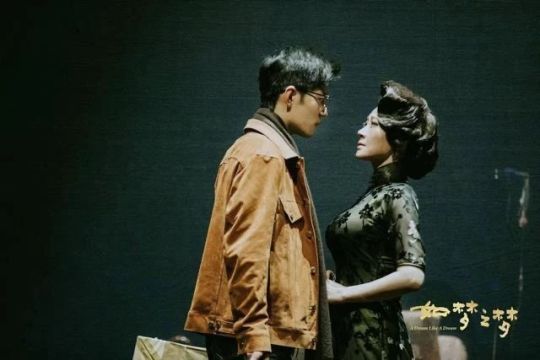
Preface
I do not see the problem with Xiao Zhan’s decision to perform, just like I do not see how anyone would be damaged by this incident. If it had a specific “influence” (I do not see how that is, it is just the decision by a theater group), then to me, the influence is – it allowed more audiences to walk into theaters, and let more platforms notice theater.
2
9 years ago, Yanghua Theater placed a huge bet on “A Dream Like A Dream”, it came from Wang Keran’s observations based on the changing times – China’s industrialization and urbanization created its first “middle-class” life, and for the first time the first generation who had completed education but yet who are also stuck in the “modern conundrum” – who am I, where did I come from, where do I go from here? The old answers were no longer effective. This generation’s problem was – how to face the coming of death, and how to face the loneliness that came with the inevitable death? In the hands of Yanghua, this question became – how do you use a touching story, outside of religion or philosophy, to give its audience the love of life and a sense of comfort?
As such, there exists such a different theater group, with a producer with very “un-modern” methods: front stage and backstage, regardless of matters, as long as it could not be clearly defined to a job, it belongs to Wang Keran only. He called himself an “artist + businessman”, the nature of a businessman was to be in-charge of investments, ensure profitability, so he had to consider from the business angle – whether this play could fulfill the extreme and common spiritual requirements of the current generation, while at the same time be able to continue running for a long time; he also had to consider from the artistic angle, taking risks while ensuring profitability, and create the play from his heart. The purity of drama is as such, those who are passionate about it would stake their lives for it.
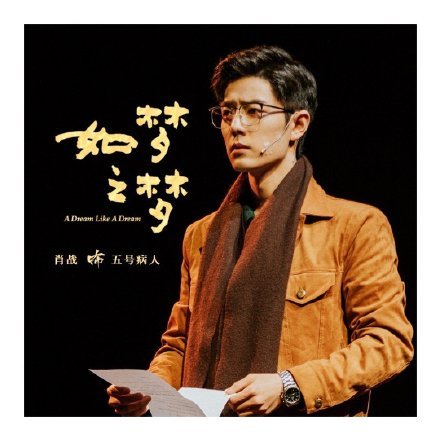
The author of “A Dream Like A Dream”, playwright Lai Shengchuan had a performance principle technique called “guide the cause, not the effect”, which meant that when the director explains the scene, he does not explain the effect he wants, but instead he would explain the reasons behind this scene clearly, that is, the character’s experience and emotional state, so as to allow the actor to create a natural performance after understanding. This was very different from the rush that is in TV dramas, which would often film out of sequence, the actors might not be clear about what he is acting as, and they could only use exaggerated actions to cover their loss of direction. Worst still, there are also actors who could only count 1, 2, 3, 4 to the camera in place of lines.
However, there are also good directors who do not like to film according to logic, and film as they wanted, while the actors did not know what they were portraying, but yet they could still create a masterpiece, Xu Haofeng’s movie review on Li An’s “Crouching Tiger, Hidden Dragon” spoke about this – Li An felt that Chow Yun-fat’s eyes were too sharp and alert, so he kept shouting “CUT” repeatedly, until Chow Yun-fat lost confidence and his gaze became scattered, so as to get the scene he wanted. Why did he not explain the “cause” at this point? Perhaps it was hard to explain, it was like a fisherman, he had to fish for the right gaze, to wait for the right sequence.
What we said above was to explain two simple things.
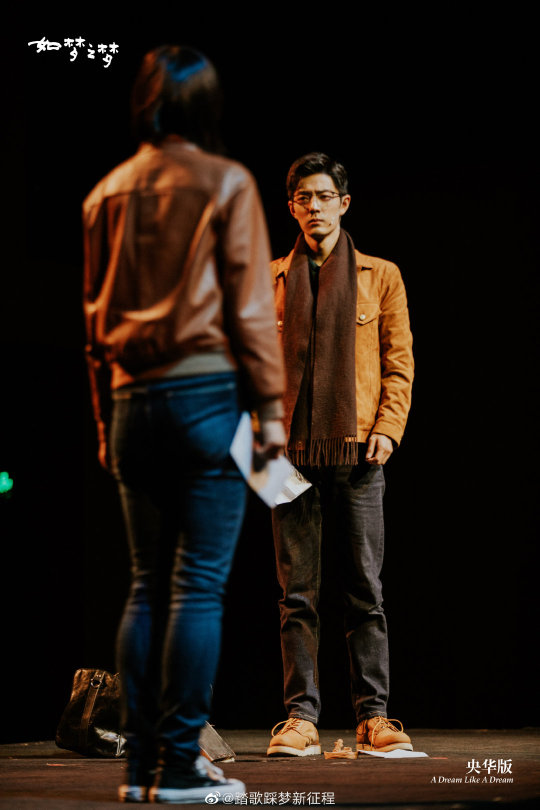
The first thing: Art can be, or even must be, done in an autocratic manner, it has to set its goal based on its audience, but how the play will be like, only one person will know, and in that creative space, there is only his method.
The other thing: The status created by an actor for the role is actually very brittle, they usually only know the outcome but they rarely know the cause. The difficult part in rehearsing “A Dream Like A Dream” came from these 31 actors who had to take on more than 100 characters, besides autocracy, there was a need to protect them from interruption and confusion. Xiao Zhan, who joined in this new version, he only had Patient No. 5 on the door of his dressing room, the other roles and burden were removed.
When we were discussing Xiao Zhan, we actually saw many versions of Xiao Zhan. Going back to basics, he is a young actor and singer. I found similarities between him and Patient No. 5: They both had the same unsettling impermanence in their fate, there were things that were not caused by them, they were merely caught in between – when you take a step back, impermanence is neither good nor bad. The problem is, which Xiao Zhan is the one standing on the stage of “A Dream Like A Dream”? If we took him as actor Xiao Zhan, then there is nothing wrong with it.
As an audience, my judging criteria is very simple: How did this new theater actor Xiao Zhan do? Based on his age and experience, Patient No. 5 is an extremely complex and hard to control character, and after 3 stops of Yanghua’s tour, the audience would probably have felt: Xiao Zhan created a brand new, intricate Patient No. 5, this character was well established onstage, this meant that his understanding and analysis was also well established.
I also prepared an observer angle, that was to see if he could blend into the strict system of theater, would be he outshone by actors who had a lot more energy, foundation and experience. The result exceeded my expectations, he not only did it, he displayed clear precision in his pace and control, and realized a complete theater experience.
I do not see the problem with Xiao Zhan’s decision to perform, just like I do not see how anyone would be damaged by this incident. If it had a specific “influence” (I do not see how that is, it is just the decision by a theater group), then to me, the influence is – it allowed more audiences to walk into theaters, and let more platforms notice theater. Chinese theater really needed more exploration in terms of content and operation. As for what influence this would have on the theater scene, audiences are very simple, as long as it was a good show onstage, they would buy tickets to watch it. As an outsider, I would also want to exclaim another statement: there were those who always said they wanted to revive the theater, but when someone really worked hard at doing it, these people would always come with their senseless controversies.

From my point of view, after I met Xiao Zhan’s “A Dream Like A Dream”, I felt that my soul had been cleansed by the waters in the lotus pond, been carefully cleaned by the fluttering spotlights and shadows akin to a bright moon, I seemed to have understood many things, there were less confusion, more courage, and a lot of gratitude to lives of those from front stage and backstage of the theater.
According to Sigmund Freud’s theory, play is a child’s unique way of gaining experience in handling matters, the function of play is to vent, venting is the purification of emotions, this is slightly different from those who take themselves as the audiences’ guide to purification. Theater has created a space to help the audience to vent what is in their hearts. After becoming an adult, it seemed like besides dreaming, there are not many methods to self-purify; besides dreaming, we could also watch “A Dream Like A Dream”.
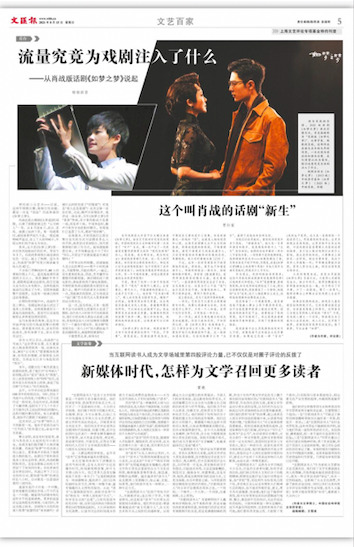
46 notes
·
View notes
Photo

Disney Attends TCA Summer Tour With Diversity In Animation Panel, Showcases Footage Of The Ghost And Molly McGee, Moon Girl And Devil Dinosaur, The Proud Family Louder And Prouder & Rise Up Sing Out
Disney Had A Panel 2 Days Ago Discussing Diversity In Animation at TCA Summer Tour.
Between The Panel The Logo Of Disney Junior’s Rise Up Sing Out was unveiled along with previous for that show, Moon Girl And Devil Dinosaur ,The Ghost And Molly McGee and The Proud Family Louder And Prouder.
Our pals at Laughing Place gave us some highlights on the panel which was mostly focused on Molly, Rise Up & Moon Girl
The Ghost And Molly McGee
“There's actually a whole episode about Molly being biracial and not quite having as much connection to her Thai roots as she wishes that she had,” actress Ashly Burch revealed, a trait that she shares with the character she voices. “It was so meaningful to me because I'm a ‘white-passing,’ biracial woman who often feels like I'm not Thai enough or doesn’t know quite what that means. And that episode is written by two Asian women who can really speak to that experience
Ashly also shared her personal perspective on why it would be meaningful for toys of Molly to exist. “I played with an Esmerelda doll because it was the closest I could get. Basically. I was like, you know, she's brown, kind of works. But then if a toy comes out of any of these characters, then you get to hold a toy and play with a toy that looks like you and is your culture.”
This could change since Disney trademarked merchandise plans for the series.
Moon Girl And Devil Dinosaur
Set to premiere in 2022, Marvel’s Moon Girl and Devil Dinosaur is based on a comic series about a 13-year-old super-genius named Lunella Lafayette who accidentally brings a 10-ton T-Rex to present-day New York City, naming him Devil Dinosaur. “I’m somebody who'd collected comic books, both DC and Marvel, and I used to read Moon-Boy and Devil Dinosaur, which is the original book created by Jack Kirby way back in the day,” explained legendary actor Laurence Fishburne, who serves as executive producer on the show. “When they updated it, I went to meet with Louis D’Esposito and the other cats over at Marvel, and we were trying to figure out a way for me to sort of enter into their world. And they showed me that book and they said, ‘What about this?”’ I was like, “‘Yeah, okay, we know what to do with that.’”
“You can't be what you can't see,” Fishburne added, referring to the importance of having characters that kids can connect with in mainstream media. “As a child, it's very important for you to be able to see examples of what you want to be, and to have the opportunity to do that here, to be able to create that for yourself.” With Disney Channel’s huge audience and Marvel’s gigantic fanbase, there seems to be infinite possibilities with this series. “Our animation team has been working really hard on trying to create a look that is kind of fresh and something that is going to catch the eye of the viewer.”
Rise Up Sing Out:
This musical Disney Junior animated short series teaches preschoolers important concepts around race, racism, and social justice designed to inspire and empower young minds. Debuting later this year, Rise Up, Sing Out features music from Ahmir “Questlove” Thompson and Tariq “Black Thought” Trotter, who also executive produce the series. The Conscious Kid, an organization dedicated to equity and promoting healthy racial identity development in youth, is working with the creators on a companion guide for parents as well.
I didn't see anyone who looked like me or who came from places that looked like where I was from in animation,” Tariq Trotter explained. “I'm sure that's had some effect on me. It definitely has helped to shape my worldview. Just the opportunity to speak to our youngest audience when they're in this most impressionable stage is super important. I think that representation across the board is super important.” The diversity isn’t exclusive to the content appearing on screen, either. “Part of what appealed to us about this relationship was how diverse everyone in the room was when we all sort of got together” “Black Thought” added. “I think they make it a priority here at the studio.”
Who knows if the panel will be made public beacuse they had footage from Moon Girl and Proud Family and i bet they will wait for NYCC 2021 to showcase something about Moon Girl and Disney+ Day to unveil The Proud Family footage.
#The Ghost And Molly McGee#Ghost And Molly McGee#Moon Girl And Devil Dinosaur#Moon Girl & Devil Dinosaur#Rise Up Sing Out#Disney Channel#Disney Junior#TCA#TCA 2021#Bill Motz#Bob Roth#Laurence Fishburne#Latoya Raveneau
30 notes
·
View notes
Text
LET'S TALK ABOUT NABI | NEVERTHELESS [ 알고있지만 ]
So I must admit, I have been swept up by the tidal wave that is “Nevertheless” aka 알고있지만.
It’s a Coming of Age, South Korean drama that released a couple of weeks ago on Netflix. It follows this young art student named Yoo Nabi, who majors in sculpting. We meet her at a particular point in her life where she is coming to realise so many things about herself and about life.
We open with a beautifully shot scene of Nabi admiring the snow, with her comparing it to the love she feels for her current lover. She enters a gallery, ready to support her artist boyfriend who has an exhibit on display.



To her shock and disappointment, she finds a sculpture made by her lover. A sculpture that exploits her very most vulnerable moments with him. Simply because to him, she’s a muse.


It confirms everything I need to know about being a muse. On the surface, it’s supposed to be flattering, it’s supposed to show that someone cares. But in reality, being a muse is dehumanising.
It is taking out the parts of someone that the artist finds unworthy and unappealing, and using what he finds beautiful. It is saying that as an artist, “I will only honour the parts of you that are of use to me; the rest can be discarded.”
Nabi experiences this humiliation is such a pointed way, that as the audience, we cannot run away from it.
Han So Hee / 한소희 , the actor who plays Nabi expresses this so brilliantly and what she feels, so effortlessly. In her portrayal, we see Nabi’s vulnerability, her complete surrender to a situation that will - for a lack of a better word - completely destroy her.

I’m comforted, however, by the fact that Nabi finds the strength to see this man for who he is. She accepts her fate as the one who got devoured. And in her hidden strength, she dumps him.
I’ll only speak briefly about the ex lover, as it is clear that this is Nabi’s story.
In this 1st episode, we see that Nabi’s ex is man who is self-centered. He only prioritises himself. He is obsessed with how Nabi deifies him. He’s always testing her feelings for him, coercing her into sex, doing his best to make her submit to his will. He is man of many insecurities and he infects Nabi with them. She is young and impressionable. He knows this. This is why he chose her. He thinks he can strip her of her agency and make her dance only for him. Such an asshole.


Anyway, Nabi finds the courage to dump him after she catches him cheating, and this decision becomes a catalyst for everything else that follows.

That same night, she meets our male lead, Park Jae-Eon (played by Song Kang 송강). There is seemingly this instantaneous attraction. Park Jae-Eon leads as this flirty, smooth type who knows his way around women. At least that’s how we see it through Nabi’s eyes. We feel her caution. She knows he’s something dangerous to play with, so she protects herself the best way she knows how - she runs away.
This becomes a central theme in Nabi’s journey. She runs away a lot. She is tempted by Jae-Eon, attracted to him. But her feelings are chaotic and often don’t make sense. So she steps back from him a lot.
I won’t say he doesn’t fully deserve it. He’s shown himself to be uninterested in commitment, preferring to flirt and kiss other women. This makes Nabi uneasy. She’s been traumatised, as we have seen.
But as she explores this connection she has with Jae-Eon, she can’t help but fall for him. He’s observant, attentive and suave. In her mind, he’s cool and unbothered. But if you pay attention to him, this isn’t really true. He even defends Nabi’s honour against a student who tries to badmouth her. He’s just really good at concealing his emotions. But so is she.
This show takes us on a crazy rollercoaster ride as these two main leads navigate the struggle of falling in love with someone when they are not necessarily ready or willing to surrender in that way.

Nabi, through her own choice, indulges in this steamy, secret affair with Jae-Eon. She neglects to tell him that she’s growing feelings for him because he seems so non-committal. I won’t even fault her for that. This is how she protects herself. She tries to maintain emotional distance from him because she knows she won’t get what she wants from him. At least not in the beginning.
There are a couple of things that I love about Nabi.
She thinks critically about where she is in life. Even if her deductions are not accurate, she shows that she takes the time to evaluate herself.
She tells herself the truth, every time. Even if she doesn’t tell her the men in her life her feelings.
By the time we get to episode 8 (as of right now, 10 August, 2021), we’ve seen Nabi go back and forth about herself & Jae-Eon. She even uses this side character, Do-Hyeok, to distract herself from admitting that she likes Jae-Eon.
Nabi represents the young feminine archetype that initially finds herself unable to separate herself from her love interests or the opinions of her community. She’s so hard on herself. She puts so much pressure on herself. As a result, she projects her self hatred onto Jae-Eon. That’s easy because she’s positioned him as her enemy, in a way.
But what Nabi also represents is the evolving feminine archetype. If she can not only accept her heartbreak but also accept that she deserves better, Nabi can evolve. She can become the young feminine who finds her light in the darkness. She can empower herself, and find strength in her ability to choose.
If she can learn to trust herself, and really trust that she can protect herself if someone doesn’t have her best interest at heart, she’ll start to have an easier time in her dating experiences. And her art will continue to grow.
Ultimately, I love Nabi. She frustrates me to no end. But I also want to hug her as a sister and let her know there’s life beyond her pain.
I hope in watching “Nevertheless”, you can have empathy for her and for Jae-Eon. And see them as one aspect of this crazy life as millennials.
I trust the director Kim Garam 김 가람 and writer Jung Won 정원 in how they have taken the time to set up these characters. As torturous as it is, I believe we will get a finale that is worth the emotions, the time and energy we have invested in these characters.
At the end of the day, I want what's best for them. My heart wants them to choose each other but my mind tells me that this isn't the most logical choice.
Either way, thank you JTBC and NETFLIX for taking a chance on such a risk with this show. It's fresh. It's new. And it's something that we can all relate to in some way.
SHOW DETAILS: NEVERTHELESS / 알고있지만
Directed by: Kim Garam 김 가람
Written by: Jung Won 정원
Airing on: Netflix : Nevertheless, | Netflix Official Site
https://www.netflix.com › title
38 notes
·
View notes
Text
I haven't watched the new Chip 'n Dale movie (and I don't plan to, because I have standards and dignity), but oh boy, do I have some opinions to give...
Personally, I'm not a big fan of cartoon characters being revealed to be jaded asshole-y actors behind the scenes, because it just ruins the whole magic. Like, they are CARTOON characters, therefore the rules of the real world do not apply to them.
For real though, the cartoon character actor trope was done more effectively in Looney Tunes: Back In Action and Who Framed Roger Rabbit?; the characters were visibly doing their job as actors, but they were still the goofy and wacky caricatures that we all know and love.
They didn't behaved like depressive douchebags, and would still pull out all sorts of physics-defying tricks and pranks while in the real 3D world, and still were 2D, too. They were respected as cartoons, through and through.
And I won't even mention the fact that an older Peter Pan is the movie's main antagonist and touch upon Disney's blalant ageism issues. Just search up for Peter's OG faceclaim, Bobby Driscoll, and you'll see what I'm talking about.
The thing is, I don't want to cartoons to constantly remind me of the real world, and how much of a shithole it is. When I watch a cartoon, is for the sole purpose of entertainment and escapism. Sure, opinions may vary, but this is how I personally feel.
I understand how good nostalgia can be, but if it's not done effectively, then it's just bait. Like as if we, the audience, were a bunch of young and impressionable babies who'll spend hours being mindlessly entertained by a shiny keyring being jangled in front of our faces.
Audiences don't like to be treated like a bunch of bumbling idiots. We deserve better than that; after all, the success of your media depends on OUR opinion and interests.
Get fucked, Disney.
Oh, and also, we all could tell that you were salty about Sonic beating Marvel Studios' box office decade-long record streak. You ain't fooling anyone, Disney; it's plain and obvious.
5 notes
·
View notes
Note
Is it me, or is all this casual slur usage just the culmination of everyone treating "homophobia" like a Funni Joek word for years? We are what we pretend to be and all.
Eh, possible, but I don’t really think it’s connected? I mean... maybe. But I too will joke that an inconvenience that affects me is “homophobia,” and I don’t think there’s anything wrong with that in and of itself in moderation.
But what I do think this maybe stems from? (Hot takes incoming...)
A) The way stan culture now sometimes includes this whole victimization vibe of jumping to “you’re literally homophobic/lesbophobic/biphobic/etc if you disagree with me on this topic” in what should be genuine discussions, which is unhelpful and often untrue. Or “oooo you wanna call me a f*g/d*ke so bad” just to be an asshole to rile people up. It’s all immature bad faith nonsense. So in that sense, you have this twin effect of people thinking the word “homophobic” doesn’t mean anything because they sling it uselessly and pointlessly to people they don’t like all the time, so when they’re told their behavior is genuinely homophobic they easily ignore that out of habit... and you have people thinking slur use is all universally reclaimed across all communities, because they toss some specific slurs around themselves, which is not how any of this works.
A big example of the latter is the fact that people can self-identify as or call themselves a slur that belongs to their community, sure, but they don’t get to assign it to other people without consent. Then it’s just slur use, full stop. And also the fact that no, if you’re a bi or lesbian cis woman that doesn’t mean you can reclaim slurs used in a derogatory way against queer men–or that one (1) queer man telling you he thinks it’s okay speaks on behalf of the entire community. It’s such a lack of queer community/history knowledge, all around–and a lack of respect, or lack of consideration for others’ experiences and feelings.
B) It also stems from hatred of men, or disregard for men’s feelings. I’m not kidding; I do think some of this is a serious culmination of that becoming normalized. It’s the subtle pervasiveness of this online idea of “It’s okay to be mean to men because men are trash, actually” and a dislike of masculinity on principle. Which, again: not how this works. But it’s why people don’t seem to care when they’re called out, and they seem to be incapable of recognizing that some of their “jokes”–i.e. threats of fake violence against someone, bodyshaming, flagrant use of homophobic slurs often used against queer men, etc.–are really not okay. But when they’re told “if someone said this about a woman, would you think it’s fine?” they just laugh and brush it off because... It’s men. What does it matter, right? It’s not that serious.
It’s like this undercurrent of the idea of “Men aren’t oppressed so there’s nothing bad about me being callous and cynical and cruel about them. They’ll live.” And not only does that demonstrate a severe, depressing lack of empathy, but it’s also untrue and not intersectional; queer men are oppressed, for example. Toxic masculinity is a problem and a struggle because while it’s not oppression, it’s a societal issue that does come with pressure. But this is the mindset these people seem to have, especially if their garbage content is about fictional men or male celebrities... because then the excuses are “he’s not real” or “he’s never gonna see this.” But they don’t realize that that doesn’t mean this sort of talk is suddenly okay and harmless if theoretically not seen by the people it’s specifically about; that this content can get normalized in this exact way, whether or not they realize it, because they can’t account for what the impressionable young people reading their posts are internalizing; and that it then also runs the risk of bleeding over into IRL spaces either at conventions with actors or just everyday interactions with other real men/queer people.
And ultimately, regardless, seeing this casual cruelty in the name of edgy humor makes real people–and especially real men–reading the words slung around online uncomfortable. That alone should be enough. But people seem to think it’s their God-given right to call anything a shitpost and it’ll suddenly be harmless.
I’m not really sure why apathy and abrasiveness and cynicism seem to be what’s considered The Cool And Funny Thing To Do, but for some reason it is, because the people popularizing that are the kinds of people who get big audiences in fandom spaces now. And it’s only getting worse. Not to sound like a hippie but uhhhh kindness and empathy and respect should be cool, actually? And if you can’t be funny without being edgy and offensive then maybe you’re not that funny? Wild.
TL;DR: I don’t think it’s from considering “homophobia” a funny joke word but I do think it’s about other phrases or mindsets along those lines being normalized as jokes.
34 notes
·
View notes
Text
JATP is like a 5-hour DCOM
As I’ve expressed previously, when I initially saw the gif-sets for this series I basically said “I’ll pass, thanks.” I don’t know what changed (probably the treachery that is the reality tv I’m currently watching), but I decided to go ahead and check it out, if only for some much needed levity.
And at first, I was not feeling this, like at all. The dialogue was cringey, the songs were *meh*, I couldn’t keep up with the show’s own internal logic.
By episode 5 however, the show was cooking with gas. We had stakes, drama (family drama! relationship drama! band drama!), villains, and yes, humor to round out the whole thing. And that’s when it hit me: this show is basically a 5-hour Disney Channel Original Movie. This shouldn’t have been so surprising, seeing as to how it’s the work of the legendary Kenny Ortega [among others].
Granted, I haven’t seen a new DCOM since 2013 apparently, so at the very least the show harkens back to the movies of yesteryear. Even so, I have to imagine movies [that I haven’t seen] like Descendants or Zombies have some of these tropes:
The Surreal, Fantasical Situation - The Thirteenth Year, The Luck of the Irish, The Other Me
The Grand Musical Numbers - High School Musical, Teen Beach Movie
The Popular Girl Who Hates Me - High School Musical, Read it and Weep, Cadet Kelly
The Band’s Interpersonal Drama - The Cheetah Girls, Lemonade Mouth
The Missing Mother - Jump In!, Smart House, Dadnapped!
The Affable Trio - Minutemen, Camp Rock
The Wacky Sidekick - Stuck In the Suburbs, Read it and Weep, KP: STD
The Forgettable Rock Songs - Camp Rock, Lemonade Mouth
The Villain Who We Don’t Know is Evil, But Has a Sympathetic Sidekick - Up, Up, and Away!, The Proud Family Movie, High School Musical (2), The Cheetah Girls (2)
The Insecure Protagonist Who’s Just Gotta Find The Strength Inside Of Them - Like every single DCOM ever
And let’s not forget Pixel Perfect, the 2004 movie that’s about a guy who has to create a holographically projected character to help his band succeed. Sound familiar?
--sn: I haven’t seen that movie in ~15 years, when I was kindergarten-aged. Still, I went to rewatch it last night and it’s amazing how you can hear a song from that long ago and go “Yea, I remember this!” Music is a wonderful thing.--
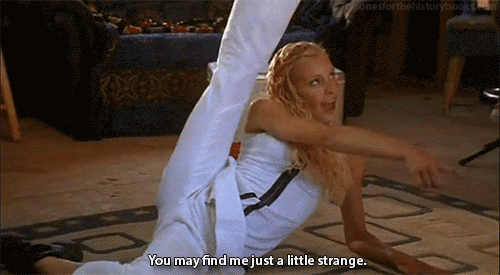
Ortega knows DCOM’s like the back of his hand. When The Cheetah Girls 2 (which Ortega choreographed and directed) premiered, it was the highest rated DCOM in history; High School Musical 2 topped that record a year later, and by the way, that record still hasn’t--nor will it ever be, I’d venture to say--topped.
He knows what makes us, the young, impressionable audience, tick and get invested with the worlds that he builds. He even understands that now, in 2020 and on Netflix, all of that gay subtext that we’ve been talking about in HSM for years can actually be a real thing. So yea, it’s no wonder that people took to this quickly.
We love tacky villains, we love good vs. evil, we love sappy love stories/love triangles, and we of course love an emotional attachment to our characters in a relatable way.
None of that is really revolutionary tv. You can get all that stuff from any of the aformentioned movies. Where the show does push the boundary is translating that to a streaming platform. It has diversity which is always a plus. It also allows Ortega to thankfully be just as gay as he wants to be. Not just with the style, because some of these dance scenes were exceptionally campy, but with the characters.
Is there a ship name for Alex and Willie? I haven’t checked the tag, I have no idea. What I do know is that the entirety of Alex’s character and storyline is for the most part lighthearted and carefree. These are the stories and character dynamics that I wish any DCOM of my childhood would have broached, the stories Ortega has gone on the record for having wanted to do previously.
The show is not trying to make a statement with that relationship -- it just is. It’s two guys who find each other and discover they have chemistry, as was done with Julie/Luke and the countless other het-ships that we’ve seen on Disney before. The drama that eventually comes between them isn’t derived from their sexuality, but the plot itself. It makes you think, “With the way HSM/DCOM’s were ingrained into our minds, how beneficial to a generation would it have been to have a couple like that in those movies?”
Well we’ll never know the answer to that question, because it never happened (thanks homophobia!). All we had was subtext, because Cadet Kelly totally had a thing for Stone. That is, until now. It took a couple of decades and a totally separate platform from Disney, but the kids of today finally [sorta] have a DCOM that dares to have openly gay characters. Ortega even in 2020 is revolutionizing the genre. And that gives me a smidgen of hope.
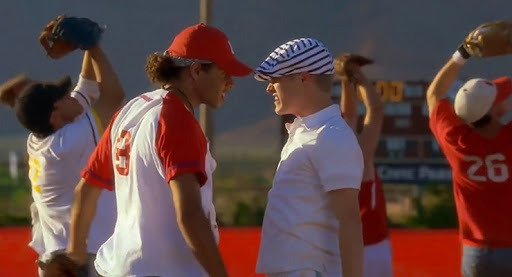
Random thoughts on the episodes:
Flynn is not a character. Now for all I’ve been nostalgic about above, we can do part with the 2-D sidekick. One day we’ll talk about how HSM 3 is a terrible movie and how Taylor got *0* character content for 3 movies while being billed as a main character, likely for diversity purposes. Today is not that day I suppose.
It was so weird that they were going there with Julie/Luke, because the actors are clearly a few years apart. Usually to play 16 year olds, a given tv show will hire 16 year olds or they’ll hire 20 year olds. This show did...both, so it’s weird to watch the grown man playing Reggie going after these girls.
The exact moment I was like, “Alright this show is okay”, is when Nick got on the stage and introduced Julie just seconds after comforting her. Mans was WYLIN.
Nick supposedly did everything right. Sucks to suck. And now he’s possessed by Kilgrave. Tuff.
Julie’s whole family dynamic was cute.
Most of the songs were catchy, but by nature of this show they all kind of had the same structure. They were nice, but I won’t be downloading a soundtrack.
So I liked it. Again, as I can’t fully keep up with the show’s logic: are the guys real humans now? That seems like one of the only plausible ways to keep the show going. But if so, should Caleb still be obsessed with them?
The million dollar question for this show as well: Where do we go from here?
21 notes
·
View notes